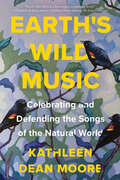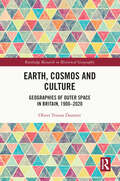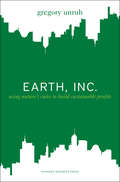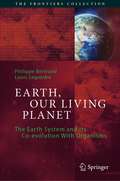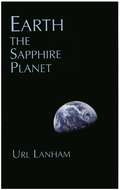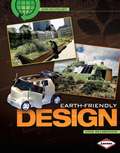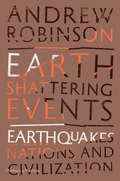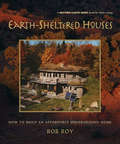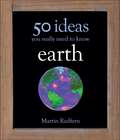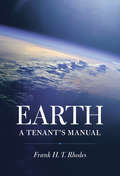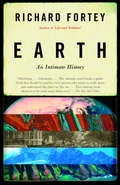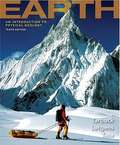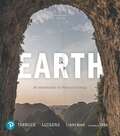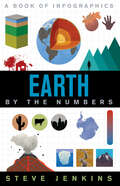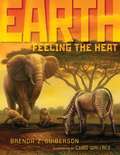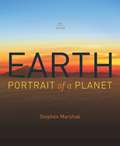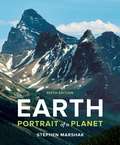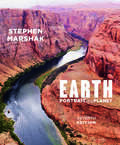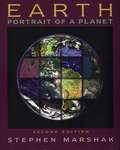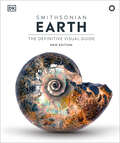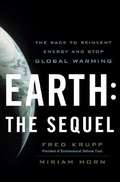- Table View
- List View
Earth's Wild Music: Celebrating and Defending the Songs of the Natural World
by Kathleen Dean MooreAt once joyous and somber, this thoughtful gathering of new and selected essays spans Kathleen Dean Moore's distinguished career as a tireless advocate for environmental activism in the face of climate change. In this meditation on the music of the natural world, Moore celebrates the call of loons, howl of wolves, bellow of whales, laughter of children, and shriek of frogs, even as she warns of the threats against them. Each group of essays moves, as Moore herself has been moved, from celebration to lamentation to bewilderment and finally to the determination to act in defense of wild songs and the creatures who sing them. Music is the shivering urgency and exuberance of life ongoing. In a time of terrible silencing, Moore asks, who will forgive us if we do not save nature's songs?
Earth, Cosmos and Culture: Geographies of Outer Space in Britain, 1900–2020 (Routledge Research in Historical Geography)
by Oliver Tristan DunnettThis book traces the development of diverse British cultures of outer space, utilizing key geographical concepts such as landscape, place, and national identity. It examines the early visionary ideas of writers H. G. Wells and Olaf Stapledon, the ambitious British space programme of the 1960s, and narrations of British cultural identity that accompanied the space missions of Helen Sharman, Beagle 2 and Tim Peake. The exploration of British cultures of outer space throughout the book helps understand the emergence of the British Interplanetary Society. It also explains its significance in pre-war and post-war periods through an analysis of the roles of influential figures such as Arthur C. Clarke and Patrick Moore. The chapters explore utopian and dystopian representations of space exploration, examine the mysterious phenomenon of UFO culture, and consider plans for humanity’s imagined future across interstellar space. Throughout the book geography is advocated as a home for critical studies of outer space, illuminating its significance in terms of the reciprocal relationships between exploration and the sublime, science and the imagination, Earth and cosmos. As an emergent field of research in the social sciences, this book makes an excellent contribution to the study of the outer space in Britain and abroad developing a distinctive kind of outer spatial geography with major implications for future teaching and research.
Earth, Ice, Bone, Blood: Permafrost and Extinction in the Russian Arctic
by Charlotte WrigleyExploring one of the greatest potential contributors to climate change—thawing permafrost—and the anxiety of extinction on an increasingly hostile planet Climate scientists point to permafrost as a &“ticking time bomb&” for the planet, and from the Arctic, apocalyptic narratives proliferate on the devastating effects permafrost thaw poses to human survival. In Earth, Ice, Bone, Blood, Charlotte Wrigley considers how permafrost—and its disappearance—redefines extinction to be a lack of continuity, both material and social, and something that affects not only life on earth but nonlife, too.Earth, Ice, Bone, Blood approaches the topic of thawing permafrost and the wild new economies and mitigation strategies forming in the far north through a study of the Sakha Republic, Russia&’s largest region, and its capital city Yakutsk, which is the coldest city in the world and built on permafrost. Wrigley examines people who are creating commerce out of thawing permafrost, including scientists wishing to recreate the prehistoric &“Mammoth steppe&” ecosystem by eventually rewilding resurrected woolly mammoths, Indigenous people who forage the tundra for exposed mammoth bodies to sell their tusks, and government officials hoping to keep their city standing as the ground collapses under it. Warming begets thawing begets economic activity— and as a result, permafrost becomes discontinuous, both as land and as a social category, in ways that have implications for the entire planet. Discontinuity, Wrigley shows, eventually evolves into extinction.Offering a new way of defining extinction through the concept of &“discontinuity,&” Earth, Ice, Bone, Blood presents a meditative and story-focused engagement with permafrost as more than just frozen ground.
Earth, Inc.
by Gregory UnruhHaving trouble reconciling your desire to do good by the environment while also moving your company forward? In Earth, Inc., Gregory Unruh shows you how to embed sustainability into everything your company does - profitably. Providing prescriptive steps that will inform your business decisions, Unruh will help you launch your company into eco-minded practices. His five Biosphere Rules apply the laws of nature as a guide for efficient and innovative business operations. Instead of a linear value chain, Unruh offers a cyclical value chain - a chain that offers both sustainability and profitability, for now and for the future.
Earth, Our Living Planet: The Earth System and its Co-evolution With Organisms (The Frontiers Collection)
by Philippe Bertrand Louis LegendreEarth is, to our knowledge, the only life-bearing body in the Solar System. This extraordinary characteristic dates back almost 4 billion years. How to explain that Earth is teeming with organisms and that this has lasted for so long? What makes Earth different from its sister planets Mars and Venus? The habitability of a planet is its capacity to allow the emergence of organisms. What astronomical and geological conditions concurred to make Earth habitable 4 billion years ago, and how has it remained habitable since? What have been the respective roles of non-biological and biological characteristics in maintaining the habitability of Earth? This unique book answers the above questions by considering the roles of organisms and ecosystems in the Earth System, which is made of the non-living and living components of the planet. Organisms have progressively occupied all the habitats of the planet, diversifying into countless life forms and developing enormous biomasses over the past 3.6 billion years. In this way, organisms and ecosystems "took over" the Earth System, and thus became major agents in its regulation and global evolution. There was co-evolution of the different components of the Earth System, leading to a number of feedback mechanisms that regulated long-term Earth conditions. For millennia, and especially since the Industrial Revolution nearly 300 years ago, humans have gradually transformed the Earth System. Technological developments combined with the large increase in human population have led, in recent decades, to major changes in the Earth's climate, soils, biodiversity and quality of air and water. After some successes in the 20th century at preventing internationally environmental disasters, human societies are now facing major challenges arising from climate change. Some of these challenges are short-term and others concern the thousand-year evolution of the Earth's climate. Humans should become the stewards of Earth.
Earth, the Sapphire Planet
by Url LanhamWith some 70 percent of its surface covered by water, the Earth presents a picture of a gemlike blue planet when viewed from outer space. This sapphire jewel -- the only planet in our solar system to sustain intelligent life -- is the subject of this remarkably engaging and concise book by biologist, teacher, and popular science writer Url Lanham. Focusing on the Earth and the life forms that have evolved on it, Mr. Lanham's captivating study covers a wide range of subjects -- from the work of Galileo, Copernicus, Herschel, and other scientists who contributed to our knowledge of Earth's position in the universe, to the Earth's internal physiology, intricacies of the biosphere, creation of continents, origins of plant and animal life, the diversity of physical habitats in which these life forms thrive, and much more. Well written and highly readable, this absorbing and optimistic natural history of the planet will take readers on a fantastic journey through time, offering up a host of facts and provocative insights. Easily accessible to advanced high school science students and college undergraduates, Earth, the Sapphire Planet will be warmly received as well by teachers and ecologically aware general readers.
Earth-Friendly Design (Saving Our Living Earth)
by Anne WelsbacherDesigners create all products, from computers and cell phones to cars and buildings, to meet the needs and desires of buyers. But did you realize that each stage in the life of a manufactured product involves processes that can damage Earth's land, air, water, and the health of living things? Earth-friendly design can help us make our planet healthier. We must join together in this quest to make, move, use, reuse, and dispose of things in Earth-friendly ways. With engaging text and eye-catching images, plus a special Going Green section, this book tells you all about Earth-friendly design and what you can do to promote it.
Earth-Shattering Events: Earthquakes, Nations, and Civilization
by Andrew Robinson"A truly welcome and refreshing study that puts earthquake impact on history into a proper perspective." --Amos Nur, Emeritus Professor of Geophysics, Stanford University, California, and author of Apocalypse: Earthquakes, Archaeology, and the Wrath of God Since antiquity, on every continent, human beings in search of attractive landscapes and economic prosperity have made a Faustian bargain with the risk of devastation by an earthquake. Today, around half of the world’s largest cities – as many as sixty – lie in areas of major seismic activity. Many, such as Lisbon, Naples, San Francisco, Teheran, and Tokyo, have been severely damaged or destroyed by earthquakes in the past. But throughout history, starting with ancient Jericho, Rome, and Sparta, cities have proved to be extraordinarily resilient: only one, Port Royal in the Caribbean, was abandoned after an earthquake. Earth-Shattering Events seeks to understand exactly how humans and earthquakes have interacted, not only in the short term but also in the long perspective of history. In some cases, physical devastation has been followed by decline. But in others, the political and economic reverberations of earthquake disasters have presented opportunities for renewal. After its wholesale destruction in 1906, San Francisco went on to flourish, eventually giving birth to the high-tech industrial area on the San Andreas fault known as Silicon Valley. An earthquake in Caracas in 1812 triggered the creation of new nations in the liberation of South America from Spanish rule. Another in Tangshan in 1976 catalysed the transformation of China into the world’s second largest economy. The growth of the scientific study of earthquakes is woven into this far-reaching history. It began with a series of earthquakes in England in 1750. Today, seismologists can monitor the vibration of the planet second by second and the movement of tectonic plates millimeter by millimeter. Yet, even in the 21st century, great earthquakes are still essentially "acts of God," striking with much less warning than volcanoes, floods, hurricanes, and even tornadoes and tsunamis.
Earth-Sheltered Houses
by Rob RoyAn earth-sheltered, earth-roofed home has the least impact upon the land of all housing styles, leaving almost zero footprint on the planet. Earth-Sheltered Houses is a practical guide for those who want to build their own underground home at moderate cost. It describes the benefits of sheltering a home with earth, including the added comfort and energy efficiency from the moderating influence of the earth on the home's temperature (keeping it warm in the winter and cool in the summer), along with the benefits of low maintenance and the protection against fire, sound, earthquake, and storm afforded by the earth. Extra benefits from adding an earth or other living roof option include greater longevity of the roof substrate, fine aesthetics, and environmental harmony.The book covers all of the various construction techniques involved, including details on planning, excavation, footings, floor, walls, framing, roofing, waterproofing, insulation, and drainage. Specific methods appropriate for the inexperienced owner/builder are a particular focus and include: Pouring one's own footings and/or floor The use of dry-stacked (surface-bonded) concrete block walls Post-and-beam framing Plank-and-beam roofing Drainage methods and self-adhesive waterproofing membranes The time-tested, easy-to-learn construction techniques described in Earth-Sheltered Houses will enable readers to embark upon their own building projects with confidence, backed up by a comprehensive resources section that lists all the latest products such as waterproofing membranes, types of rigid insulation, and drainage products that will protect the building against water damage and heat loss. Rob Roy is a former contractor with 27 years of experience and 12 previous books to his credit, including Cordwood Building and Timber Framing for the Rest of Us. An expert on underground building, he founded the Earthwood Building School in 1981 with his wife, Jaki, and is frequently a speaker at events throughout North America.
Earth: 50 Ideas You Really Need to Know
by Martin RedfernThis latest book in Quercus's bestselling "50 Ideas" series is a wonderfully accessible overview of the only place we know of in the universe that is capable of sustaining life. Expert popular science writer Martin Redfern covers all the natural processes of the Earth: climate, ocean currents, air currents, the elements, plate tectonics, fossils, the evolution of life, volcanology, sea levels and the ultimate fate of the Earth.
Earth: A Tenant's Manual
by Frank H. T. Rhodes"It's impossible to grasp the whole planet or integrate all the descriptions of it. But because we live here, we have to try. This is not just an artistic compulsion or an existential yearning, still less an academic exercise. It's a survival issue. This is the only planet we have. We're stuck here, and we don't own the place-it would be the height of arrogance to assume that we do. We're tenants here, not owners, but we're tenants with hope for a long-term tenancy. We want to extend our lease just as far as we can. "-from Earth: A Tenant's ManualIn Earth: A Tenant's Manual, the distinguished geologist Frank H. T. Rhodes, President Emeritus of Cornell University, provides a sweeping, accessible, and deeply informed guide to the home we all share, showing us how we might best preserve the Earth's livability for ourselves and future generations. Rhodes begins by setting the scene for our active planet and explaining how its location and composition determine how the Earth works and why it teems with life. He emphasizes the changes that are of concern to us today, from earthquakes to climate change and the clashes over the energy resources needed for the earth's exploding population. He concludes with an extended exploration of the humanity's prospects on a complex, protean, and ultimately finite world. It is not a question of whether the planet is sustainable; the challenge facing life on Earth-and the life of the Earth-is whether an expanding and high-consumption species like ours is sustainable. Only new resources, new priorities, new policies and, most of all, new knowledge, can reverse the damage that humanity is doing to our home-and ourselves. A sustainable human future, Rhodes concludes in this eloquent, sobering, but ultimately optimistic book, will require a sense of responsible stewardship, for we are not owners of this planet; we are tenants. Surveying the systems, large and small, that govern Earth's processes and influence its changes, Rhodes addresses the negative consequences of human activities for the health of its regulatory systems, but offers practical suggestions as to how we might effect repairs, or at least limit further damage to our home.
Earth: A True Book
by Larry Dane BrimnerDescribes the planet Earth, exploring its composition, early ideas about its shape and position in the solar system, current theories about its creation, and its important relationship with the moon.
Earth: An Intimate History
by Richard ForteyIn Earth, the acclaimed author of Trilobite! and Life takes us on a grand tour of the earth's physical past, showing how the history of plate tectonics is etched in the landscape around us. Beginning with Mt. Vesuvius, whose eruption in Roman times helped spark the science of geology, and ending in a lab in the West of England where mathematical models and lab experiments replace direct observation, Richard Fortey tells us what the present says about ancient geologic processes. He shows how plate tectonics came to rule the geophysical landscape and how the evidence is written in the hills and in the stones. And in the process, he takes us on a wonderful journey around the globe to visit some of the most fascinating and intriguing spots on the planet. From the Trade Paperback edition.
Earth: An Introduction To Physical Geology 10th Edition
by Edward J. Tarbuck Frederick K. Lutgens Dennis TasaWith its strong focus on readability and illustrations, this trusted best seller makes an often-complex subject more accessible for readers like you. It offers a meaningful, non-technical survey that is informative and up-to-date for learning basic principles and concepts. For the Tenth Edition, the text's design and figures have been updated, and the chapter on climate change has been revised significantly.
Earth: An Introduction to Physical Geology
by Edward J. Tarbuck Dennis G. Tasa Frederick K Lutgens Scott LinnemanBringing Earth to life Earth: An Introduction to Physical Geology, 13th Edition, is a leading text in the field, characterized by no-nonsense, student-friendly writing, excellent illustrations, and a modular learning path driven by learning objectives. The new edition is the first to integrate 3D technology that brings geology to life. This edition features significant content updates, a new Geology in the News feature to promote student engagement, and a new Data Analysis feature to help develop students’ critical thinking skills.
Earth: By The Numbers (By the Numbers)
by Steve JenkinsCaldecott Honor winner Steve Jenkins introduces By the Numbers infographic readers chock full of incredible infographs and stunning, full-color cut-paper illustrations. Earth will focus on the fascinating ins-and-outs of earth science.Through infographics, illustrations, facts, and figures, readers will learn about the complex and wonderful place we call home, Earth. Discover some of the most fascinating aspects of our planet through astonishing numbers: the stretch of time from Earth's formation to the present, the misleading way the surface area of a continent can appear on a map, the angle of Earth's axis that creates the seasons, what percentage of Earth's land is covered in deserts or forests or cities, and so much more. With his signature style, Steve Jenkins explores the most fascinating fields of natural science.
Earth: Feeling the Heat
by Brenda Z. GuibersonIN EVERY CORNER of the world, humans zoom zoom from here to there, push buttons, turn keys, and flip switches. With clever inventions, people fly like birds and keep warm like polar bears. But to do these things, humans burn oil, gas, and coal, all of which release particles into the air. These particles hover over the earth like a thick blanket that traps sunshine and makes everything extra warm. This is called global warming. People and all the animals are feeling the heat. You can help by using less energy. Even the little things you do can make a big difference!
Earth: Portrait of a Planet
by Stephen MarshakThis new edition will only enhance its success. It has been thoroughly revised to ensure current coverage of all major topics, especially earthquakes (including the disaster in Haiti in 2010), volcanoes, and climate change. The drawn art represents the state of the art and is both pedagogically innovative and a feast for the eyes. The Google Earth exercises provide virtual field trips to the entire world.
Earth: Portrait of a Planet
by Stephen MarshakThe most dynamic, hands-on introduction to physical geology.Marshak gives students the tools they need for an enriching hands-on geology experience, in and out of class. The Sixth Edition includes an expanded suite of interactive simulations, Narrative Art videos, Real-World videos, and animations built on the vibrant art from the text. New Smartwork5 online activities provide visual and interactive questions with answer-specific feedback. And the Geotours Google Earth(tm) exercises get students applying what they've learned to real-life site explorations. These easy-to-use tools combine with Marshak's signature narrative approach to the text and art program to give students the most effective means for visualizing, interacting with, and mastering geology concepts.
Earth: Portrait of a Planet (Seventh Edition)
by Stephen MarshakMarshak geology meets active, virtual learning. The gold standard text for helping students visualize and understand geologic processes makes hands-on and real-world exploration easier and more impactful than ever, in any course setting. New 3D specimen and digital elevation models, with corresponding Smartwork exercises, allow students to examine specimens and sites as if they were in the field or lab. And new highly visual “Practice What You Know” and “What Can You See?” activities at the end of each chapter and in Smartwork help students synthesize and apply important concepts like a geologist. Thoroughly updated with current events and essential data, the Seventh Edition also reveals the dynamism of geology and how it impacts our lives. This purchase offers access to the digital ebook only.
Earth: Portrait of a Planet (second edition)
by Stephen MarshakIntroductory geology text. This book is extremely well written and very easy to understand.
Earth: The Definitive Visual Guide, New Edition (DK Definitive Visual Encyclopedias)
by DKExplore and understand the natural and human wonders of our planetNow in its third edition, this landmark encyclopedia both celebrates our planet and explains the science underpinning the forces and processes that have made and shaped it. Artworks, photographs, terrain models, and maps are used in combination to capture the beauty and power of landscapes and natural events and to show their hidden sides, explaining for example how an earthquake is triggered and how burning fossil fuels is driving a climate emergency.Directory sections placed throughout the book provide systematic and in-depth reference guides to core scientific information, such as more than 100 types of rocks and minerals. Similar sections contain visual profiles of some of the undisputed wonders of the natural world, from the Andes and Himalayas to the Grand Canyon, Sahara Desert, and Amazon Rainforest.Thoroughly revised and updated to include new and spectacular landscape photography and capture the latest developments in fast-changing areas of geology and Earth science—including Earth history, climate change, and urban geography—this is an indispensable visual reference book for anyone who wants to understand how our planet works.
Earth: The Race to Reinvent Energy and Stop Global Warming
by Fred Krupp Miriam HornHOW TO HARNESS THE GREAT FORCES OF CAPITALISM TO SAVE THE WORLD FROM CATASTROPHE. The forecasts are grim and time is running out, but that's not the end of the story. In this book, Fred Krupp, longtime president of Environmental Defense Fund, brings a stirring and hopeful call to arms: We can solve global warming. And in doing so, we will build the new industries, jobs, and fortunes of the twenty-first century. In these pages the reader will encounter the bold innovators and investors who are reinventing energy and the ways we use it. Among them: a frontier impresario who keeps his ice hotel frozen all summer long with the energy of hot springs; a utility engineer who feeds smokestack gases from coal-fired plants to voracious algae, then turns them into fuel; and a tribe of Native Americans, for two thousand years fishermen in the roughest Pacific waters, who are now harvesting the fierce power of the waves themselves. These entrepreneurs are poised to remake the world's biggest business and save the planet-if America's political leaders give them a fair chance to compete.
